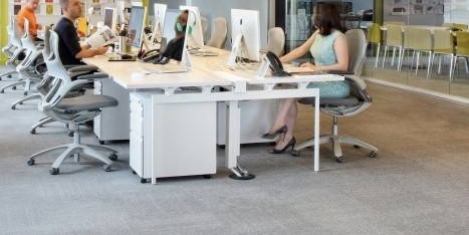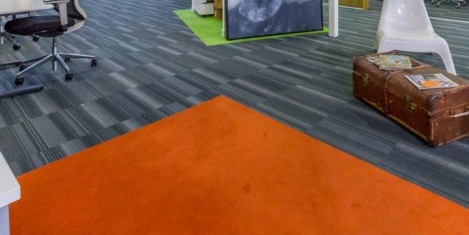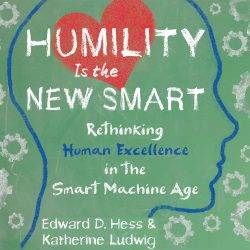March 6, 2017
US employers turn to perks and office design to increase employee retention 0
 Younger workers are less and less loyal to employers, which is driving firms to place greater emphasis on benefits, empowerment and a better working environment, according to a study from ReportLinker. The small scale online study of 500 people found that Millennials are less likely than older generations to say they’re highly committed to their employer, with just 40 percent saying they somewhat agree with this statement compared to 66 percent of older workers say they’re highly committed to their organisation. The report concludes that this is encouraging employers to introduce new ways of winning the loyalty of employees. For example, 87 percent of employees who are more involved in decision-making are also more likely to say they are committed to their employers although, as always, we should be wary of the distinction between correlation and causation.
Younger workers are less and less loyal to employers, which is driving firms to place greater emphasis on benefits, empowerment and a better working environment, according to a study from ReportLinker. The small scale online study of 500 people found that Millennials are less likely than older generations to say they’re highly committed to their employer, with just 40 percent saying they somewhat agree with this statement compared to 66 percent of older workers say they’re highly committed to their organisation. The report concludes that this is encouraging employers to introduce new ways of winning the loyalty of employees. For example, 87 percent of employees who are more involved in decision-making are also more likely to say they are committed to their employers although, as always, we should be wary of the distinction between correlation and causation.









 The average amount of overtime workers put in equates to around 68 working days a year and the fact that only one third are paid for this means the majority of people are essentially working for free until the 9th of March each year, claims a new study. The research by TotallyMoney.com with OnePoll, which looked into overtime in the UK in 2017 found that unsurprisingly 60 percent of British workers say they don’t have a good work-life balance. Common reasons given for working overtime were pressures from colleague and excessive workloads; with almost 65 percent of people surveyed not being paid for overtime worked. Only a third of British workers say they typically leave work on time; which ties in with recent TUC analysis which revealed that the number of employees working longer hours grew by 15 percent over the last five years. Working longer hours, warns the union, not only has negative impacts on health, but can actually lead to workers being less productive.
The average amount of overtime workers put in equates to around 68 working days a year and the fact that only one third are paid for this means the majority of people are essentially working for free until the 9th of March each year, claims a new study. The research by TotallyMoney.com with OnePoll, which looked into overtime in the UK in 2017 found that unsurprisingly 60 percent of British workers say they don’t have a good work-life balance. Common reasons given for working overtime were pressures from colleague and excessive workloads; with almost 65 percent of people surveyed not being paid for overtime worked. Only a third of British workers say they typically leave work on time; which ties in with recent TUC analysis which revealed that the number of employees working longer hours grew by 15 percent over the last five years. Working longer hours, warns the union, not only has negative impacts on health, but can actually lead to workers being less productive.
 Demand for construction workers in London looks set to grow due to the completion of Crossrail and the extension of the Northern Line alongside other infrastructure projects. But a new analysis reveals the Capital is struggling to attract and train the workforce needed; with London and the South East having a shortfall of 60,000 people in the construction industry. This is according to a first of its kind analysis of the role of migration on London’s economy by London First and PwC.
Demand for construction workers in London looks set to grow due to the completion of Crossrail and the extension of the Northern Line alongside other infrastructure projects. But a new analysis reveals the Capital is struggling to attract and train the workforce needed; with London and the South East having a shortfall of 60,000 people in the construction industry. This is according to a first of its kind analysis of the role of migration on London’s economy by London First and PwC.
 Fostering behavioural change among employees to encourage them to make healthier lifestyle choices could deliver both productivity gains and economic growth, a new report claims. According to Human-Centric Health: Behaviour Change and the Prevention of Non-Communicable Diseases, by the World Economic Forum in collaboration with Willis Towers Watson, behavioural economics will be critical to encourage healthier lifestyles and reduce the burden of non-communicable diseases (cardiovascular disease, mental illness, cancer, chronic respiratory disease and diabetes) that account for approximately 16 million premature deaths annually and will cost an estimated cumulative loss of $47 trillion in economic activity worldwide over the next two decades. According to the analysis, technology such as mobile phones with accelerometers that make activity challenges easier and engage individuals in a community of supportive peers will improve people’s understanding of health-related knowledge and encourage them to reshape their behaviour. Linking individuals to ‘commitment contracts’ to exercise, quit smoking, or adhere to medicine prescription schedules will also be easier to monitor using sensors and mobile technology.
Fostering behavioural change among employees to encourage them to make healthier lifestyle choices could deliver both productivity gains and economic growth, a new report claims. According to Human-Centric Health: Behaviour Change and the Prevention of Non-Communicable Diseases, by the World Economic Forum in collaboration with Willis Towers Watson, behavioural economics will be critical to encourage healthier lifestyles and reduce the burden of non-communicable diseases (cardiovascular disease, mental illness, cancer, chronic respiratory disease and diabetes) that account for approximately 16 million premature deaths annually and will cost an estimated cumulative loss of $47 trillion in economic activity worldwide over the next two decades. According to the analysis, technology such as mobile phones with accelerometers that make activity challenges easier and engage individuals in a community of supportive peers will improve people’s understanding of health-related knowledge and encourage them to reshape their behaviour. Linking individuals to ‘commitment contracts’ to exercise, quit smoking, or adhere to medicine prescription schedules will also be easier to monitor using sensors and mobile technology.


 Very few organisations are ready to manage a workforce where the latest technologies and people work side by side. Just 13 percent of UK companies are ready to respond to digital disruption and create “the organisation of the future”; despite 88 per cent believing this has become a priority. This is according to the 2017 Deloitte Global Human Capital Trends survey, which tracks the top trends shaping the agenda for HR and business leaders. However, while UK companies believe they are ill-prepared for the change brought by digital disruption, this has not stopped many of them from embracing disruptive technologies. 42 per cent report that they have adopted robotics, cognitive and artificial intelligence (AI) technologies within all or parts of their workforce. Another 42 per cent are running pilots in certain areas of their organisation. But only 16 per cent say they are ready to manage a workforce with people, robots and AI working side by side.
Very few organisations are ready to manage a workforce where the latest technologies and people work side by side. Just 13 percent of UK companies are ready to respond to digital disruption and create “the organisation of the future”; despite 88 per cent believing this has become a priority. This is according to the 2017 Deloitte Global Human Capital Trends survey, which tracks the top trends shaping the agenda for HR and business leaders. However, while UK companies believe they are ill-prepared for the change brought by digital disruption, this has not stopped many of them from embracing disruptive technologies. 42 per cent report that they have adopted robotics, cognitive and artificial intelligence (AI) technologies within all or parts of their workforce. Another 42 per cent are running pilots in certain areas of their organisation. But only 16 per cent say they are ready to manage a workforce with people, robots and AI working side by side.
 New and updated guidance s being published today by Acas to help employers and their staff understand the many different types of employment arrangements that exist in the modern workplace and their legal entitlements. The revised guidance is released against the backdrop of Matthew Taylor (Chief Executive of the Royal Society of the Arts)
New and updated guidance s being published today by Acas to help employers and their staff understand the many different types of employment arrangements that exist in the modern workplace and their legal entitlements. The revised guidance is released against the backdrop of Matthew Taylor (Chief Executive of the Royal Society of the Arts) 



 Implementing new technologies over the next 12 months is of primary importance for senior managers, with nearly two-fifths of finance directors saying digital transformation is one of their greatest priorities. Against a backdrop of economic uncertainty, chief financial officers (CFOs) are focusing on increasing profitability (41 percent) and driving overall company growth (39 percent) in the year ahead, according to research from,
Implementing new technologies over the next 12 months is of primary importance for senior managers, with nearly two-fifths of finance directors saying digital transformation is one of their greatest priorities. Against a backdrop of economic uncertainty, chief financial officers (CFOs) are focusing on increasing profitability (41 percent) and driving overall company growth (39 percent) in the year ahead, according to research from, 










February 21, 2017
What you need to know about changes to business rates and lease renewals 0
by Alex Watt • Comment, Facilities management, Legal news, Property
(more…)